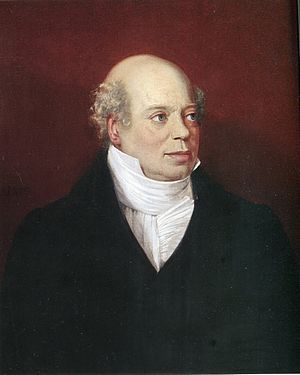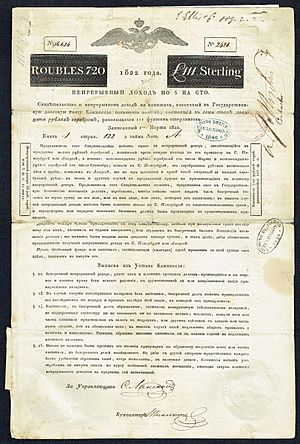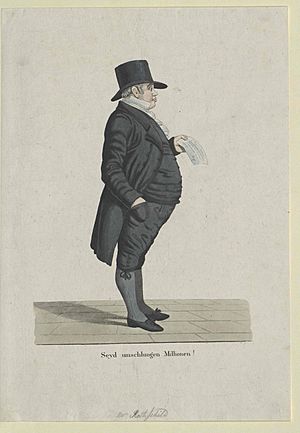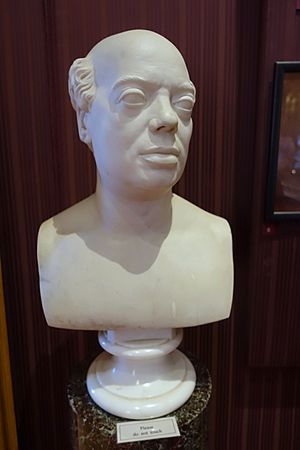Nathan Mayer Rothschild facts for kids
Quick facts for kids
Nathan Mayer Rothschild
|
|
|---|---|
 |
|
| Born | 16 September 1777 Frankfurt, Holy Roman Empire
|
| Died | 28 July 1836 (aged 58) Frankfurt, German Confederation
|
| Known for | Rothschild banking family of England |
| Spouse(s) |
Hannah Barent-Cohen
(m. 1806) |
| Children |
|
| Parent(s) | Mayer Amschel Rothschild Guttle Schnapper |
Nathan Mayer Rothschild (16 September 1777 – 28 July 1836) was an English-German banker, businessman and financier. Born in Frankfurt am Main, he was the third of the five sons of Mayer Amschel Rothschild and his wife, Guttle (née Schnapper). He was the founder of the English branch of the prominent Rothschild family.
Contents
Early life, origins in Frankfurt
Nathan Mayer Rothschild was born on 16 September 1777 to Mayer Amschel Rothschild and Guttle Schnapper in the Jewish ghetto area of Frankfurt in the Holy Roman Empire (in present-day Germany). He was born to an Ashkenazi Jewish family. He was the third son, and his brothers were Amschel Mayer Rothschild, Salomon Mayer Rothschild, Carl Mayer Rothschild and James Mayer Rothschild. All five brothers would go on to become close business partners spread out across Europe. They had five sisters, including Henriette Rothschild, who married Abraham Montefiore.
Move to England and involvement in textile trade
In 1798, at the age of 21, he settled in Manchester, England, and established a business in textile trading and finance. He later moved to London and began dealing on the London Stock Exchange from 1804. He made a fortune in trading bills of exchange through a banking enterprise begun in 1805, dealing with financial instruments such as foreign bills and government securities.
Rothschild became a freemason of the Emulation Lodge, No. 12, of the Premier Grand Lodge of England on 24 October 1802, in London. Up until this point, the few Ashkenazi Jews who lived in England tended to belong to the "Antients" on account of their generally lower social class, while the more established Sephardim joined the Moderns.
Gold, securities trading and the Napoleonic Wars
From 1809, Rothschild began to deal in gold bullion and developed this as a cornerstone of his business, which was to become N. M. Rothschild & Sons. From 1811 on, in negotiation with Commissary-General John Charles Herries, he undertook to transfer money to pay Wellington's troops, on campaign in Portugal and Spain against Napoleon, and later to make subsidy payments to British allies when these organized new troops after Napoleon's disastrous Russian campaign.
Later, during the 1840s, as early socialists in France (such as Alphonse Toussenel and Pierre Leroux) attacked the Rothschilds and "Jewish financiers" in general, a French socialist from among their circle, Georges Marie Mathieu-Dairnvaell, authored a work entitled Histoire édifiante et curieuse de Rothschild Ier, Roi des Juifs ("Edifying and Curious History of Rothschild the First, King of the Jews"). Within it, he made claims about Nathan Mayer Rothschild's early knowledge of the outcome of the Battle of Waterloo, whose couriers delivered information about the victory back to London before the British Cabinet itself knew, claiming that he used this knowledge to speculate on the London Stock Exchange and make a vast fortune by unfair advantage against the other British stock holders, essentially defrauding them.
The Rothschild family and others have claimed that this embellished version of events originated in Mathieu-Dairnvaell's 1846 writing, was further embellished by John Reeves in 1887 in The Rothschilds: the Financial Rulers of Nations, and then repeated in other popular accounts like that of Morton and the 1934 American film directed by Alfred L. Werker, The House of Rothschild.
Historian Niall Ferguson agrees that the Rothschilds' couriers did get to London first and alerted the family to Napoleon's defeat, but argues that since the family had been banking on a protracted military campaign, the losses arising from the disruption to their business more than offset any short-term gains in bonds after Waterloo. Rothschild capital did soar, but over a much longer period: Nathan's breakthrough had been prior to Waterloo when he negotiated a deal to supply cash to Wellington's army. The family made huge profits over a number of years from this governmental financing by adopting a high-risk strategy involving exchange-rate transactions, bond-price speculations, and commissions.
The Rothschild family archives confirm that, although "it is virtually part of English history that Nathan Mayer Rothschild made 'a million' or 'millions' out of his early information about the Battle of Waterloo, the evidence is slender". It notes the presence in the archives of a contemporary letter from a Rothschild courier, John Roworth, who wrote to Nathan: "I am informed by Commissary White that you have done well by the early information which you had of the Victory gained at Waterloo." The archivists suggest that this comment – the only hard evidence of Rothschild making a fortune going long on UK gilts – may, in fact, have been a reference to business dealings between Rothschild and the British Government, as suggested by Ferguson. (The contract for supplying cash to Wellington's army had been offered precisely because of Rothschild's international network. "The Government had already failed to establish a similar network of its own and had been let down by other more established London firms, and the Rothschild courier and communications network had gained a justifiable reputation for speed and reliability.") It confirms that the Rothschild couriers brought news of victory at Waterloo "a full 48 hours before the government’s own riders brought the news to Downing Street", but the archive has no records to estimate the size of any gain Rothschild made. "But knowing the structure of the market we can conclude that however much Nathan made out of Waterloo, it must have been very considerably less than a million pounds, let alone 'millions'."
It is also very commonly reported that the Rothschilds' advanced information was caused by the speed of prized racing pigeons, held by the family. However, this is widely disputed and the Rothschild archive states that, although pigeon post "was one of the tools of success in the Rothschild business strategy during the period c. 1820–1850,... it is likely that a series of couriers on horseback brought the news" of Waterloo to Rothschild.
More recently, Brian Cathcart has refuted the claim that Rothschild was the first man in London to know of the victory at Waterloo. He traces the earliest news to a dispatch Wellington sent via his messenger to Lord Bathurst, the Secretary of War, which was received on the evening of 21 June.
Family ascent to prominence
In 1816, his four brothers were raised to the nobility (Adelung) by the Emperor of Austria. They were now permitted to prefix the Rothschild name with the particle von, although outside the German-speaking world it was common practice across Europe to use the language of diplomacy, rendering names and titles in French, in this case: de.
In 1818 he arranged a £5 million loan to the Prussian government and the issuing of bonds for government loans formed a mainstay of his bank's business. He gained a position of such power in the City of London that by 1825–1826 he was able to supply enough coin to the Bank of England to enable it to avert a liquidity crisis.
It appears that Nathan Mayer was the originator of the family device of the 'Five Arrows'. The origin is said to be a Persian tale told to the Patriarch, Mayer Amschel, as the family gathered around his death-bed, when he is said to have observed that the tale was applicable to his own family: individually an arrow may be easily broken, but when held as a bundle they would be unbreakable. In 1818, Nathan Meyer applied for a grant of arms, on learning that gentry status would suffice, and had the Five Arrows confirmed for himself and his wider family.
In 1822, all five brothers were granted the title of Baron, or raised to the Freiherrnstand, by the Emperor. From 1822, both Nathan Mayer himself, and any legitimate male descendant, could call himself: Freiherr von Rothschild, or in the language of diplomacy whether in France or not, Baron de Rothschild. In practice, having accepted the aristocratic title for the benefit of his family, he chose not to use it himself and so did not request official recognition of the title. In 1838, two years after his death, Queen Victoria did authorise the use of this Austrian title in the United Kingdom.
In 1824, together with Moses Montefiore, he founded the Alliance Assurance Company, which later merged with Sun Insurance to form Sun Alliance.
Slavery
In the aftermath of the Slavery Abolition Act 1833 with the Slave Compensation Act 1837, Rothschild and his business partner Moses Montefiore loaned the British Government £15 million (worth £1.17 billion in 2025) with interest which was subsequently paid off by the British taxpayers (ending in 2015). This money was used to compensate the slave owners in the British Empire after the trade had been abolished. According to the Legacies of British Slave-Ownership at the University College London, Rothschild himself was a successful claimant under the scheme.
He was a beneficiary as mortgage holder to a plantation in the colony of Antigua (present day Antigua and Barbuda) which included 158 enslaved Black people. He received a £2,571 compensation payment, at the time (worth £200 thousand in 2025) .
Later dealings and death
In 1835 he secured a contract with the Spanish Government giving him the rights to the Almadén mines in southern Spain, effectively gaining a European mercury monopoly. He died from an infected abscess in 1836. His body was brought to London for burial, with the funeral procession on 8 August from his house on New Court in the City of London to the Brady Street Ashkenazi Cemetery in Whitechapel accompanied by three police Superintendents (those of the London City Police and of H and K Divisions of the new Metropolitan Police), William Taylor Copeland (Lord Mayor of London) and contingents from the Jews' Orphan Asylum and the Jews' Free School, and the graveside address given by Chief Rabbi Solomon Hirschell. Nathan's wife Hannah was later buried alongside him.
Legacy
By the time of his death, his personal net worth amounted to 0.62% of British national income. He had also secured the position of the Rothschilds as the preeminent investment bankers in Britain and Europe. His son, Lionel Nathan Rothschild (1808–1879), continued the family business in England. During his life, Nathan Mayer Rothschild, as the most accomplished of his brothers, solidified the Rothschild family as a major power in European and thus world affairs. Their great rivals, the Baring family, said of Nathan Mayer and his family; "They are generally well planned, with great cleverness and adroitness in execution -- but he is in money and funds what Bonaparte was in war."
The German poet Heinrich Heine, a Jewish convert to Lutheranism, declared "money is the God of our time and Rothschild is his prophet", he described Nathan Mayer Rothschild as one of "three terroristic names that spell the gradual annihilation of the old aristocracy", alongside Cardinal Richelieu and Maximilien Robespierre. For Heine, Richelieu had destroyed the power of the old feudal aristocracy, Robespierre had "decapitated" its weakened remnant and now Rothschild signified the creation of a new social elite, as new lords of finance. The financial system which the Rothschilds created during this period was viewed as a revolutionary development, with a cosmopolitan emphasis, due to the high liquidity of assets in the new system based in bonds, instead of being based in land.
Personal life
On 22 October 1806 in London, he married Hannah Barent-Cohen (1783–1850), daughter of Levy Barent Cohen (1747–1808) and wife Lydia Diamantschleifer. Hannah Barent-Cohen was the aunt of Benjamin Frederik David Philips, the founder of Philips, and Karl Heinrich Marx. Their children were:
- Charlotte Rothschild (1807–1859) married 1826 Anselm von Rothschild (1803–1874) Vienna
- Lionel Nathan (1808–1879) married 1836 Charlotte von Rothschild (1819–1884) Naples
- Anthony Nathan (1810–1876) married 1840 Louise Montefiore (1821–1910)
- Nathaniel (1812–1870) married 1842 Charlotte de Rothschild (1825–1899) Paris
- Hannah Mayer (1815–1864) married 1839 Hon. Henry FitzRoy (1807–1859)
- Mayer Amschel (1818–1874) married 1850 Juliana Cohen (1831–1877)
- Louise von Rothschild (1820–1894) married 1842 to her first cousin Mayer Carl von Rothschild (1820–1886) Frankfurt
See also
 In Spanish: Nathan Mayer Rothschild para niños
In Spanish: Nathan Mayer Rothschild para niños
- History of the Jews in England
- Rothschild banking family of England




